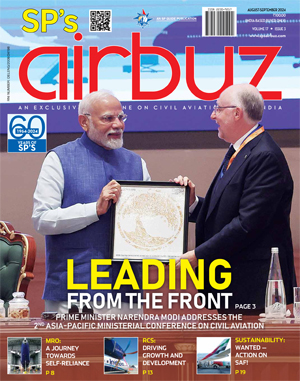Editor’s Note
This edition of SP’s AirBuz highlights the aviation industry’s transformative journey, spotlighting advancements in technology, sustainability, and economics. From autonomous cargo solutions to India’s air cargo ambitions, this issue champions sustainability with eco-friendly airports and industry commitments toward net-zero emissions, promising a quieter and cleaner future for air travel.

The aviation industry is experiencing a transformative journey fuelled by advancements in technology, sustainability, and economics. SP’s AirBuz delves into these exciting developments, showcasing how they are reshaping the very fabric of air travel. Rohit Goel’s article, “Future Freighters,” explores the burgeoning air cargo industry, highlighting the rise of autonomous delivery solutions. These innovations promise to revolutionise logistics by offering faster, cheaper, and more environmentally friendly transportation options. The article goes beyond passenger planes, showcasing how the very definition of “cargo” is evolving in the skies.
Swaati Ketkar’s article analyses India’s ambitious goal of becoming a major player in the global air cargo market by 2024. Despite being a relatively smaller segment of commercial aviation, air cargo has steadily gained importance as a vital medium for transporting goods and services. She sheds light on India’s rapidly growing air cargo sector, exploring its current size, freighter fleet composition, and the role of technology in its future success.
This edition of SP’s AirBuz champions the various facets of sustainability through a multitude of articles. Against a backdrop of mounting apprehensions surrounding the ecological footprint of air travel, key Original Equipment Manufacturers (OEMs) within the aviation sphere are resolutely devoted to pioneering sustainable initiatives. Rohit Goel covers their collective endeavours to forge a pathway toward a future wherein air travel embodies enhanced environmental stewardship and sustainability.
Then we have an article with a focus on eco-friendly airport infrastructure. The Navi Mumbai International Airport Limited (NMIAL) project, valued at a staggering eighteen thousand crores, takes centre stage. This visionary initiative boasts of being India’s first airport with dedicated infrastructure for sustainable aviation fuel (SAF) storage and refuelling. Swaati Ketkar explores how NMIAL will not only revolutionise air travel in the region but also alleviate traffic congestion for passengers in Mumbai and Navi Mumbai.
Additionally, this issue of SP’s AirBuz highlights Pratt & Whitney’s commitment to propelling the industry towards achieving net-zero aviation carbon dioxide emissions by 2050. Also, an exclusive interview with Anastasija Visnakova, Vice President of Sales & Marketing at Deutsche Aircraft, delves into the company’s mission for sustainable flying and its vision for integrated regional transportation solutions.
CFM International’s next-generation RISE engine architecture is another exciting development explored in this edition. This groundbreaking technology and innovative design targets lower noise levels and aims for 100 per cent sustainable aviation fuel certification, marking a significant step towards a quieter and cleaner future for air travel.
All this and more in this issue of SP’s AirBuz. Welcome aboard and we wish you many happy landings!





